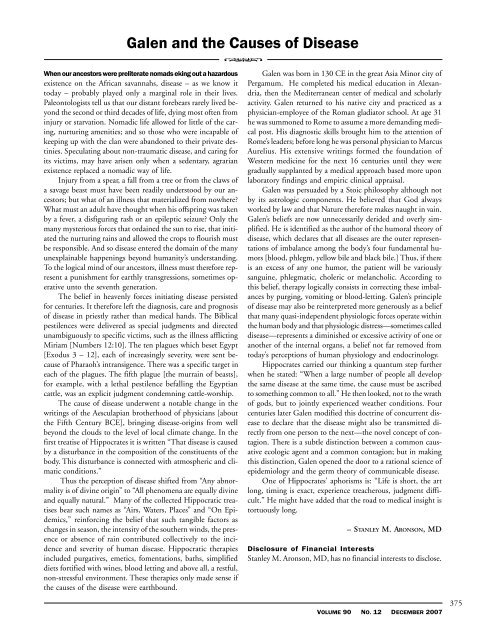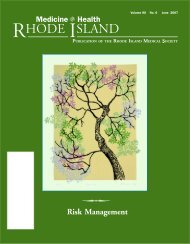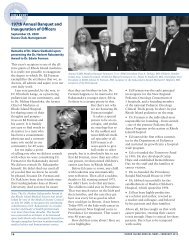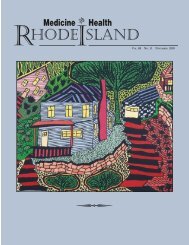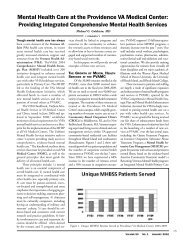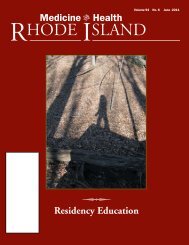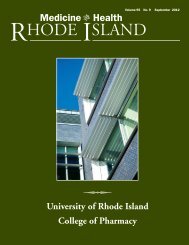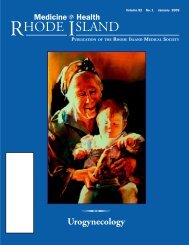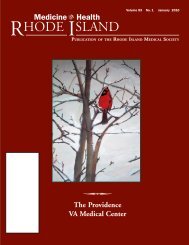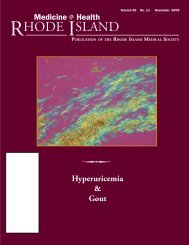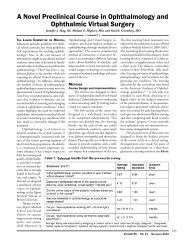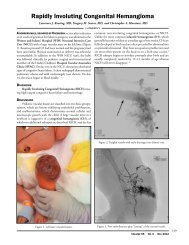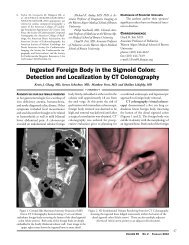The Blue Cross & Blue Shield of RI and Brown University ...
The Blue Cross & Blue Shield of RI and Brown University ...
The Blue Cross & Blue Shield of RI and Brown University ...
Create successful ePaper yourself
Turn your PDF publications into a flip-book with our unique Google optimized e-Paper software.
Galen <strong>and</strong> the Causes <strong>of</strong> Disease<br />
<br />
When our ancestors were preliterate nomads eking out a hazardous<br />
existence on the African savannahs, disease – as we know it<br />
today – probably played only a marginal role in their lives.<br />
Paleontologists tell us that our distant forebears rarely lived beyond<br />
the second or third decades <strong>of</strong> life, dying most <strong>of</strong>ten from<br />
injury or starvation. Nomadic life allowed for little <strong>of</strong> the caring,<br />
nurturing amenities; <strong>and</strong> so those who were incapable <strong>of</strong><br />
keeping up with the clan were ab<strong>and</strong>oned to their private destinies.<br />
Speculating about non-traumatic disease, <strong>and</strong> caring for<br />
its victims, may have arisen only when a sedentary, agrarian<br />
existence replaced a nomadic way <strong>of</strong> life.<br />
Injury from a spear, a fall from a tree or from the claws <strong>of</strong><br />
a savage beast must have been readily understood by our ancestors;<br />
but what <strong>of</strong> an illness that materialized from nowhere?<br />
What must an adult have thought when his <strong>of</strong>fspring was taken<br />
by a fever, a disfiguring rash or an epileptic seizure? Only the<br />
many mysterious forces that ordained the sun to rise, that initiated<br />
the nurturing rains <strong>and</strong> allowed the crops to flourish must<br />
be responsible. And so disease entered the domain <strong>of</strong> the many<br />
unexplainable happenings beyond humanity’s underst<strong>and</strong>ing.<br />
To the logical mind <strong>of</strong> our ancestors, illness must therefore represent<br />
a punishment for earthly transgressions, sometimes operative<br />
unto the seventh generation.<br />
<strong>The</strong> belief in heavenly forces initiating disease persisted<br />
for centuries. It therefore left the diagnosis, care <strong>and</strong> prognosis<br />
<strong>of</strong> disease in priestly rather than medical h<strong>and</strong>s. <strong>The</strong> Biblical<br />
pestilences were delivered as special judgments <strong>and</strong> directed<br />
unambiguously to specific victims, such as the illness afflicting<br />
Miriam [Numbers 12:10]. <strong>The</strong> ten plagues which beset Egypt<br />
[Exodus 3 – 12], each <strong>of</strong> increasingly severity, were sent because<br />
<strong>of</strong> Pharaoh’s intransigence. <strong>The</strong>re was a specific target in<br />
each <strong>of</strong> the plagues. <strong>The</strong> fifth plague [the murrain <strong>of</strong> beasts],<br />
for example, with a lethal pestilence befalling the Egyptian<br />
cattle, was an explicit judgment condemning cattle-worship.<br />
<strong>The</strong> cause <strong>of</strong> disease underwent a notable change in the<br />
writings <strong>of</strong> the Aesculapian brotherhood <strong>of</strong> physicians [about<br />
the Fifth Century BCE], bringing disease-origins from well<br />
beyond the clouds to the level <strong>of</strong> local climate change. In the<br />
first treatise <strong>of</strong> Hippocrates it is written “That disease is caused<br />
by a disturbance in the composition <strong>of</strong> the constituents <strong>of</strong> the<br />
body. This disturbance is connected with atmospheric <strong>and</strong> climatic<br />
conditions.”<br />
Thus the perception <strong>of</strong> disease shifted from “Any abnormality<br />
is <strong>of</strong> divine origin” to “All phenomena are equally divine<br />
<strong>and</strong> equally natural.” Many <strong>of</strong> the collected Hippocratic treatises<br />
bear such names as “Airs, Waters, Places” <strong>and</strong> “On Epidemics,”<br />
reinforcing the belief that such tangible factors as<br />
changes in season, the intensity <strong>of</strong> the southern winds, the presence<br />
or absence <strong>of</strong> rain contributed collectively to the incidence<br />
<strong>and</strong> severity <strong>of</strong> human disease. Hippocratic therapies<br />
included purgatives, emetics, fomentations, baths, simplified<br />
diets fortified with wines, blood letting <strong>and</strong> above all, a restful,<br />
non-stressful environment. <strong>The</strong>se therapies only made sense if<br />
the causes <strong>of</strong> the disease were earthbound.<br />
Galen was born in 130 CE in the great Asia Minor city <strong>of</strong><br />
Pergamum. He completed his medical education in Alex<strong>and</strong>ria,<br />
then the Mediterranean center <strong>of</strong> medical <strong>and</strong> scholarly<br />
activity. Galen returned to his native city <strong>and</strong> practiced as a<br />
physician-employee <strong>of</strong> the Roman gladiator school. At age 31<br />
he was summoned to Rome to assume a more dem<strong>and</strong>ing medical<br />
post. His diagnostic skills brought him to the attention <strong>of</strong><br />
Rome’s leaders; before long he was personal physician to Marcus<br />
Aurelius. His extensive writings formed the foundation <strong>of</strong><br />
Western medicine for the next 16 centuries until they were<br />
gradually supplanted by a medical approach based more upon<br />
laboratory findings <strong>and</strong> empiric clinical appraisal.<br />
Galen was persuaded by a Stoic philosophy although not<br />
by its astrologic components. He believed that God always<br />
worked by law <strong>and</strong> that Nature therefore makes naught in vain.<br />
Galen’s beliefs are now unnecessarily derided <strong>and</strong> overly simplified.<br />
He is identified as the author <strong>of</strong> the humoral theory <strong>of</strong><br />
disease, which declares that all diseases are the outer representations<br />
<strong>of</strong> imbalance among the body’s four fundamental humors<br />
[blood, phlegm, yellow bile <strong>and</strong> black bile.] Thus, if there<br />
is an excess <strong>of</strong> any one humor, the patient will be variously<br />
sanguine, phlegmatic, choleric or melancholic. According to<br />
this belief, therapy logically consists in correcting these imbalances<br />
by purging, vomiting or blood-letting. Galen’s principle<br />
<strong>of</strong> disease may also be reinterpreted more generously as a belief<br />
that many quasi-independent physiologic forces operate within<br />
the human body <strong>and</strong> that physiologic distress—sometimes called<br />
disease—represents a diminished or excessive activity <strong>of</strong> one or<br />
another <strong>of</strong> the internal organs, a belief not far removed from<br />
today’s perceptions <strong>of</strong> human physiology <strong>and</strong> endocrinology.<br />
Hippocrates carried our thinking a quantum step further<br />
when he stated: “When a large number <strong>of</strong> people all develop<br />
the same disease at the same time, the cause must be ascribed<br />
to something common to all.” He then looked, not to the wrath<br />
<strong>of</strong> gods, but to jointly experienced weather conditions. Four<br />
centuries later Galen modified this doctrine <strong>of</strong> concurrent disease<br />
to declare that the disease might also be transmitted directly<br />
from one person to the next—the novel concept <strong>of</strong> contagion.<br />
<strong>The</strong>re is a subtle distinction between a common causative<br />
ecologic agent <strong>and</strong> a common contagion; but in making<br />
this distinction, Galen opened the door to a rational science <strong>of</strong><br />
epidemiology <strong>and</strong> the germ theory <strong>of</strong> communicable disease.<br />
One <strong>of</strong> Hippocrates’ aphorisms is: “Life is short, the art<br />
long, timing is exact, experience treacherous, judgment difficult.”<br />
He might have added that the road to medical insight is<br />
tortuously long.<br />
– STANLEY M. ARONSON, MD<br />
Disclosure <strong>of</strong> Financial Interests<br />
Stanley M. Aronson, MD, has no financial interests to disclose.<br />
VOLUME 90 NO. 12 DECEMBER 2007<br />
375


